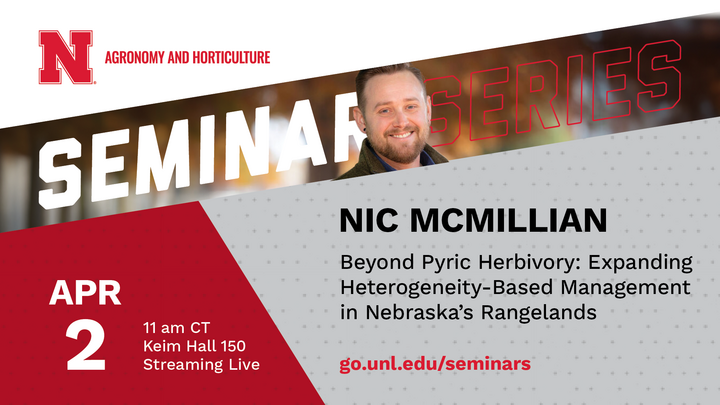2026 Spring Seminar Series
All seminars are free and open to the public. Seminars will be in person on Thursdays, streamed live at 11 a.m. CST/CDT, and recorded unless otherwise noted. Refreshments will be served at 10:30 a.m.
Join seminar via Zoom at: https://go.unl.edu/agrohortseminar
Feb. 19, 2026

Grain Development Under Higher Temperature
Harkamal Walia
Professor, Department of Agronomy and Horticulture, University of Nebraska–Lincoln
Grain development is highly sensitive under heat stress. Walia explores this sensitivity in multiple cereal crops such as rice, wheat and barley. This presentation will provide a perspective on some of the components that increase the heat sensitivity during grain development.
Feb. 26, 2026

Generative and Physical AI for Crop Production Decision-Making: Current Progress and Future Directions
Nipuna Chamara
Research Assistant Professor, Department of Biological Systems Engineering, University of Nebraska–Lincoln
This seminar explores how generative AI and physical AI systems can improve real-time crop production decisions. Chamara will present Nebraska-based research on AI-driven irrigation, nitrogen management and sensor-integrated decision platforms, demonstrating performance in field trials and outlining future opportunities for scalable, producer-ready precision agriculture tools.
March 5, 2026

Cultivating Climate Adaptation with Small-Scale and Underserved Farmers: Science as Public Value
Tonya Haigh
Research Assistant Professor, School of Natural Resources, Social Science Coordinator, National Drought Mitigation Center, University of Nebraska–Lincoln
Smaller-scale agricultural producers across the U.S. are facing new challenges with regard to drought and shifting climate patterns. Haigh will share research and engagement with farmers from the Santa Ana Pueblo to the Corn Belt states aimed at readying agricultural systems to meet these challenges.
March 26, 2026

Nebraska On-Farm Research Network 2025 Summary
Adam Leise
Assistant Extension Educator, On-Farm Research Network Manager, Nebraska Extension
The Nebraska On-Farm Research Network is a structured platform where farmers can test products, practices or cropping systems in their fields, using their equipment. We address critical questions relating to natural resources and sustainability, agronomic decision-making and economic return on investment of farming scenarios.
April 2, 2026

Beyond Pyric Herbivory: Expanding Heterogeneity-Based Management in Nebraska’s Rangelands
Nic McMillian
Assistant Professor, Department of Agronomy and Horticulture and School of Natural Resources, University of Nebraska–Lincoln
As a rangeland ecologist at UNL, McMillian will share ongoing research examining how additional non‑fire management options can complement the well‑established role of pyric herbivory in promoting heterogeneity across Nebraska’s increasingly fire‑limited rangelands. This work evaluates how these approaches shape forage dynamics, livestock use and conservation outcomes on working landscapes.
April 9, 2026

Integrating Teaching, Research, and Outreach in Horticulture Education
Christian Stephenson
Assistant Professor of Practice, Department of Agronomy and Horticulture, University of Nebraska-Lincoln
Strategic integration of teaching, research and outreach creates the potential for broader impact. Using case studies of student research engagement, citizen science and teacher workshops, this seminar will demonstrate practical approaches to reach communities whole enhancing research outcomes and student learning.
April 16, 2026
TBD
Michael Castellano
Professor and Lead, Iowa Nitrogen Initiative, William T. Frankenberger Professorship in Soil Science, Department of Agronomy, Iowa State University
April 23, 2026
TBD
Jeewan Jyot
Director of Licensing, NUtech Ventures, University of Nebraska–Lincoln
Translating Drones and AI Toward Public Value in Agriculture
Yeyin Shi
Associate Professor, Department of Biological Systems Engineering, University of Nebraska–Lincoln
How can drones and AI help detect crop stress and enable timely, precise interventions? This seminar features Shi's collaborative research on sensing and spray-drone technologies, developed with agronomists, plant scientists and engineers, to support real-time decision-making and targeted interventions that improve efficiency and sustainability.
Feb. 5, 2026

From Manure Microbes to Meaningful Policy: Science that Serves the Public
Lisa Durso
Professor Emerita, Department of Agronomy and Horticulture, University of Nebraska–Lincoln
Manure is not just a farm by‑product. It’s a powerhouse microbial ecosystem with implications for food safety, environmental health and the future of sustainable agriculture. This talk highlights over 20 years of research on the role of manure-borne microbes on human, animal, and crop and environmental health, including examples connecting the science to real‑world impact: smarter policies, better communication with the public, and practical solutions that benefit farmers, consumers and communities.
Note: This video presentation will not be posted on the website.
Feb. 12, 2026

Innovation through Collaboration — Celebrating 120 years of UNL-USDA Partnerships
Virginia Jin
Research Soil Scientist, Leader and Location Coordinator, USDA Agricultural Research Service, Lincoln, Nebraska
This presentation reviews the long history of collaboration between UNL and USDA, including a summary of our current research and impacts.
Note: This video presentation will not be posted on the website.